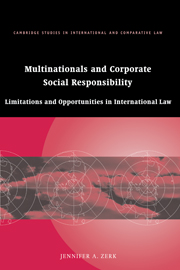 Multinationals and Corporate Social Responsibility
Multinationals and Corporate Social Responsibility Book contents
- Frontmatter
- Contents
- Preface
- Table of treaties, declarations and other international instruments
- Table of cases
- Table of statutes and statutory instruments
- List of abbreviations
- Introduction
- Part I Regulatory issues and problems
- Part II Home state regulation of multinationals
- Part III International regulation of multinationals
- 6 Towards an international law of CSR?
- 7 Multinationals and CSR: limitations and opportunities in international law
- Bibliography
- Index
- CAMBRIDGE STUDIES IN INTERNATIONAL AND COMPARATIVE LAW
6 - Towards an international law of CSR?
Published online by Cambridge University Press: 23 July 2009
- Frontmatter
- Contents
- Preface
- Table of treaties, declarations and other international instruments
- Table of cases
- Table of statutes and statutory instruments
- List of abbreviations
- Introduction
- Part I Regulatory issues and problems
- Part II Home state regulation of multinationals
- Part III International regulation of multinationals
- 6 Towards an international law of CSR?
- 7 Multinationals and CSR: limitations and opportunities in international law
- Bibliography
- Index
- CAMBRIDGE STUDIES IN INTERNATIONAL AND COMPARATIVE LAW
Summary
Based on developments so far, what are the prospects of a new body of law emerging, an ‘international law of corporate social responsibility’? How would it be structured? What form would it take? To whom would it be addressed? What would the primary obligations be? Would it focus primarily on human rights, or would it encompass wider concerns?
This chapter is a preliminary attempt to answer these questions. As discussed in previous chapters, international law on CSR could be based on customary law, or could be regulated by treaty, or both. It could be addressed to multinationals themselves, or home states, or host states, or all three. While the regulatory methods are still very much open to negotiation, considerable effort has already been invested at international level in devising ‘soft law’ standards for multinationals. This chapter begins with a brief history of the various different international regulatory projects aimed at multinationals and CSR, some of which have been discussed in earlier chapters. None of these involves any formal enforcement measures as yet, but this does not mean that they are not legally significant. On the contrary, these various ‘codes of conduct’, ‘guidelines’ and ‘principles’ contain a number of recurring themes which, if given sufficient support by the international community, could eventually develop into binding obligations. The second part of this chapter is an attempt to draw out some of these key themes.
- Type
- Chapter
- Information
- Multinationals and Corporate Social ResponsibilityLimitations and Opportunities in International Law, pp. 243 - 298Publisher: Cambridge University PressPrint publication year: 2006


